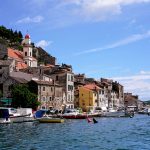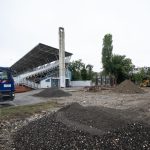ZAGREB, September 12, 2018 – A Frontex-run training programme called “Land and Border Surveillance Officer Training” is currently underway in Valbandon, near Pula, for 45 police officers from EU countries and is being conducted together with the Croatian Police Academy, which is a partner to the Frontex Academy.
Frontex coordinator at the Police Academy Mirjana Abramović said that the aim of these activities was to educate Croatian and EU police officers and strengthen joint capacities to participate in international operations aimed at suppressing illegal migrations. According to her, Croatia is investing a lot in strengthening capacities and in training police officers as an EU member state.
The training camp will last five days and will provide an opportunity for police officers to practise tactics at border crossings, the treatment of asylum seekers, treatment of migrants requiring medical attention and treatment of irregular migrants within the European Union.
Last year, the Police Academy became a partner to the Frontex Academy which involves exchanging good police practise between member states, implementing training courses, preparing training courses for police officers to participate in international Frontex operations with aim of controlling the external EU border.
Frontex provides additional technical support for EU countries facing severe migratory pressure. It coordinates the deployment of specially trained staff and technical equipment with the end aim of strengthening border police capacities and developing common training standards for border authorities.
In the meantime, Croatian Ambassador to Bosnia and Herzegovina Ivan Del Vechio visited on Wednesday Una-Sana Canton in Bosnia and said that it was in Croatia’s interest for the problem of irregular migrations to be put under control and announced help to local authorities in that part of the country to deal with the challenge more efficiently.
“It is in Croatia’s interest for that problem to be resolved as soon as possible,” Ambassador Del Vechio said in Bihać after meeting with canton prime minister Husein Rošić.
According to the information I was given, the situation in that part of Bosnia and Herzegovina is slowly getting back to normal even though it is “far from ideal,” he said.
Una-Sana canton has the greatest concentration of illegal migrants who are trying to transit through Croatia and continue on their journey toward Western countries.
Rošić said that local authorities estimate that there are about three thousand illegal migrants currently in the canton. Thus, there are fewer migrants than in previous months when there were up to five thousand and any given moment.
Rošić said that it is clear that some migrants have managed to continue on their way, a few have been deported from Bosnia to those countries they came from, but the most important thing is that police agencies have stepped up their control of the border with Serbia and Montenegro which has led to fewer migrants entering the country.
More than 13,000 entries into Bosnia by migrants have been registered since the start of the year.








